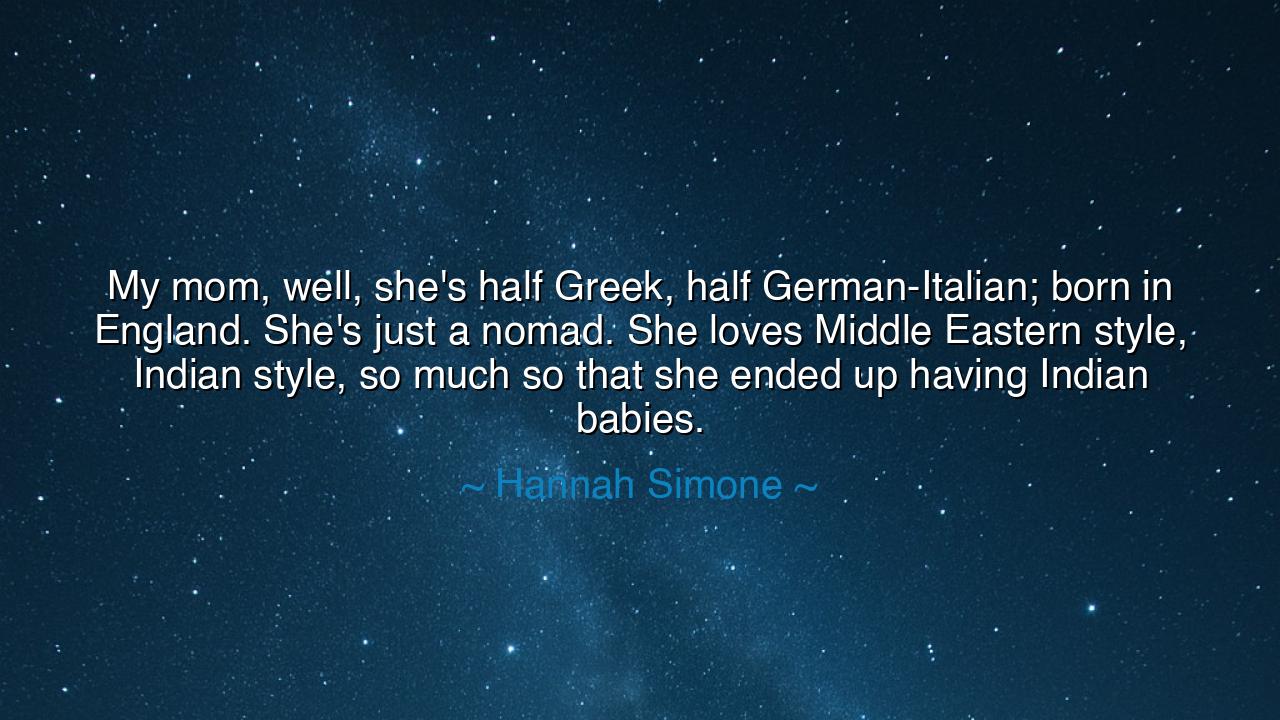
My mom, well, she's half Greek, half German-Italian; born in
My mom, well, she's half Greek, half German-Italian; born in England. She's just a nomad. She loves Middle Eastern style, Indian style, so much so that she ended up having Indian babies.






When Hannah Simone said, “My mom, well, she's half Greek, half German-Italian; born in England. She's just a nomad. She loves Middle Eastern style, Indian style, so much so that she ended up having Indian babies,” her words shimmered with both humor and heritage. Beneath the playfulness lies a profound meditation on identity, belonging, and the wondrous tapestry of human connection. In her description of her mother — a woman of many roots, drawn to many cultures — Simone offers a portrait of the modern soul, one that cannot be confined by borders or ancestry, one that moves through the world gathering beauty wherever it is found.
In ancient times, such a person would have been called a citizen of the world — a spirit too large for one nation, too curious for a single creed. The Greek philosopher Diogenes once declared, “I am a citizen of the cosmos,” and in that declaration, he freed himself from the walls of state and tribe. Simone’s mother embodies that same ancient wisdom. Her Greek, German, Italian, and English lineage flows like a river that refuses to choose one shore. Instead, it carries with it the stories, flavors, and dreams of many lands — and when she fell in love with the Indian world, it was not appropriation, but recognition: the soul recognizing another reflection of itself.
To be a nomad, as Simone calls her, is not to be lost; it is to be found in motion. Her mother’s wanderings, her love for diverse cultures, reflect a deep truth — that the human heart was never meant to be stationary. From the dawn of civilization, people have traveled not just to survive, but to understand — to see how others live, worship, love, and create. Through travel, the spirit expands. The mother who wore the colors of the Middle East and the patterns of India was not trying to escape her origins; she was weaving them into a greater whole, creating harmony where the world prefers separation.
We see this same spirit in history’s great travelers — those who defied the narrowness of their age to embrace a broader vision of humanity. Ibn Battuta, the Moroccan explorer, journeyed through Africa, the Middle East, India, and China, not seeking conquest but understanding. His writings reflect an awe for the diversity of the human family and a reverence for what unites us beneath it all. Simone’s mother, in her way, is a kindred soul to such wanderers — those who understand that the earth has one heartbeat, expressed in countless forms.
When Hannah Simone laughs and says her mother “ended up having Indian babies,” it is more than a witty remark; it is a statement of destiny fulfilled. Love has always been the great bridge between civilizations, the quiet revolution that unites what politics divides. In her mother’s affection for the East, we glimpse not coincidence but connection — a harmony between her inner world and the wider world. The children born of such unions carry not confusion, but continuity — living proof that humanity was always meant to blend, to evolve, to love across boundaries.
There is also wisdom here for our time, when nations grow fearful and people retreat behind walls. Simone’s quote reminds us that identity is not diminished by diversity — it is enriched by it. To carry many heritages is to be a living library of experience. To love cultures not your own is to honor the shared spirit of creation that runs through all art, language, and music. Her mother’s life teaches that we can belong to many places without betraying any, and that beauty is not bound by geography but by imagination.
Thus, the lesson to carry forward is this: embrace the nomad within you. Let curiosity guide your steps; let admiration replace judgment. Learn from those whose songs are not your own. For each culture you understand, each story you listen to, adds another color to your soul. The ancient wisdom holds true — the more we wander with open hearts, the closer we come to knowing what it means to be human.
In the end, Hannah Simone’s words are not only a tribute to her mother but to the eternal traveler in all of us — the seeker of harmony in difference, the collector of beauty in diversity, the lover of life in all its forms. Her mother’s story is proof that we are not fragments scattered by the winds of time, but pieces of a greater whole — the ever-unfolding mosaic of humanity. And when we live as she did, fearless in love and boundless in spirit, we fulfill one of the oldest truths whispered through the ages: that the earth is one home, and all who love it are family.






AAdministratorAdministrator
Welcome, honored guests. Please leave a comment, we will respond soon